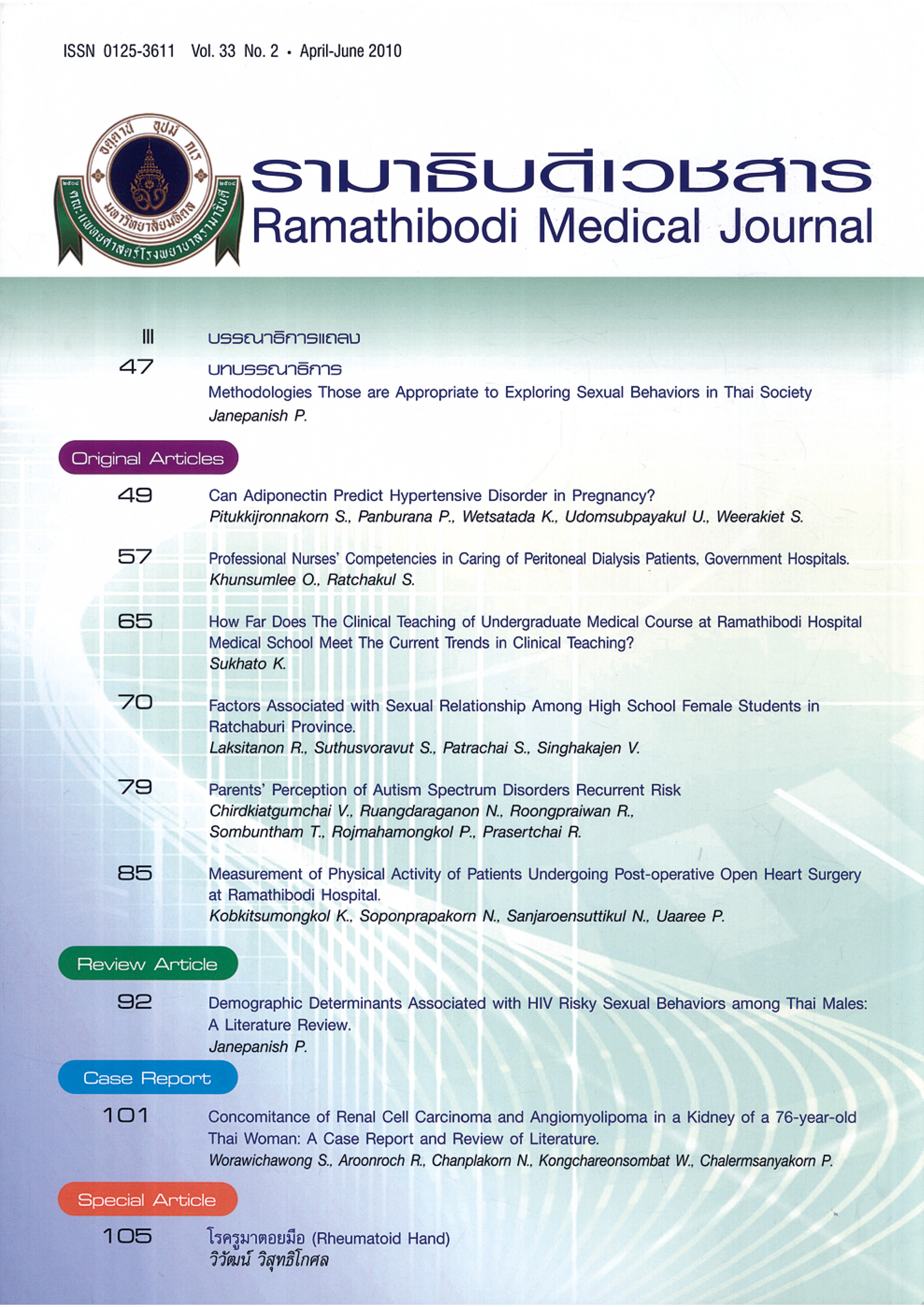Parents' Perception of Autism Spectrum Disorders Recurrent Risk
Main Article Content
Abstract
Background: The recurrence risk of idiopathic autism spectrum disorders (ASDs) in the subsequent child is between 2-8% for parents who have already had one affected child. Parents' accurate perception of this recurrence risk is important since it affects their decisions regarding future reproduction.
Objective: To study parental perception of the recurrence risk of ASDs in their subsequent child.
Methods: Parents with a child diagnosed with an ASD without known etiology at Child Development Clinic and Child and Adolescent Psychiatric Clinic at Ramathibodi Hospital were contacted by mail during February 1 to March 31, 2008 for an invitation to participate in this study by answering a questionnaire and mailing back to the researcher within two weeks.
Results: Among 252 parents who participated in the study, only 26% had accurate perception of the recurrence risk, 44% overestimated this risk, 25% perceived that there was no risk of ASDs in their subsequent child, and another 5% were unsure.
Conclusion: The result of this study showed that the recurrence risk knowledge in these parents was still inadequate. This information suggests medical professionals to be more proactive in counseling the parents in order to help them make an appropriate decision on having another child.
Article Details
References
American Psychiatric Association. Diagnostic and Statistical Manual of Mental Disorders, Text Revision (DSM-IV-TR). 4 th ed. Washington, DC: American Psychiatric Association; 2000.
Committee on Children With Disabilities. American Academy of Pediatrics: The pediatrician's role in the diagnosis and management of autistic spectrum disorder in children. Pediatrics. 2001;107(5):1221-6. doi:10.1542/peds.107.5.1221.
Baird G, Simonoff E, Pickles A, et al. Prevalence of disorders of the autism spectrum in a population cohort of children in South Thames: the Special Needs and Autism Project (SNAP). Lancet. 2006;368(9531):210-5. doi:10.1016/S0140-6736(06)69041-7.
Bertrand J, Mars A, Boyle C, Bove F, Yeargin-Allsopp M, Decoufle P. Prevalence of autism in a United States population: the Brick Township, New Jersey, investigation. Pediatrics. 2001;108(5):1155-1161. doi:10.1542/peds.108.5.1155.
Chakrabarti S, Fombonne E. Pervasive developmental disorders in preschool children: confirmation of high prevalence. Am J Psychiatry. 2005;162(6):1133-1141. doi:10.1176/appi.ajp.162.6.1133.
McMahon WM, Baty BJ, Botkin J. Genetic counseling and ethical issues for autism. Am J Med Genet C Semin Med Genet. 2006;142C(1):52-57. doi:10.1002/ajmg.c.30082.
Muhle R, Trentacoste SV, Rapin I. The genetics of autism. Pediatrics. 2004;113(5):e472-e486. doi:10.1542/peds.113.5.e472.
Autism Genome Project Consortium, Szatmari P, Paterson AD, et al. Mapping autism risk loci using genetic linkage and chromosomal rearrangements. Nat Genet. 2007;39(3):319-328. doi:10.1038/ng1985.
Johnson CP, Myers SM; American Academy of Pediatrics Council on Children With Disabilities. Identification and evaluation of children with autism spectrum disorders. Pediatrics. 2007;120(5):1183-1215. doi:10.1542/peds.2007-2361.
Freitag CM. The genetics of autistic disorders and its clinical relevance: a review of the literature. Mol Psychiatry. 2007;12(1):2-22. doi:10.1038/sj.mp.4001896.
El-Fishawy P, State MW. The genetics of autism: key issues, recent findings, and clinical implications. Psychiatr Clin North Am. 2010;33(1):83-105. doi:10.1016/j.psc.2009.12.002.
Freitag CM, Staal W, Klauck SM, Duketis E, Waltes R. Genetics of autistic disorders: review and clinical implications. Eur Child Adolesc Psychiatry. 2010;19(3):169-178. doi:10.1007/s00787-009-0076-x.
Selkirk CG, McCarthy Veach P, Lian F, Schimmenti L, LeRoy BS. Parents' perceptions of autism spectrum disorder etiology and recurrence risk and effects of their perceptions on family planning: Recommendations for genetic counselors. J Genet Couns. 2009;18(5):507-519. doi:10.1007/s10897-009-9233-0.
Whitelaw C, Flett P, Amor DJ. Recurrence risk in Autism Spectrum Disorder: a study of parental knowledge. J Paediatr Child Health. 2007;43(11):752-754. doi:10.1111/j.1440-1754.2007.01156.x.
Mercer L, Creighton S, Holden JJ, Lewis ME. Parental perspectives on the causes of an autism spectrum disorder in their children. J Genet Couns. 2006;15(1):41-50. doi:10.1007/s10897-005-9002-7.
Myers SM, Johnson CP; American Academy of Pediatrics Council on Children With Disabilities. Management of children with autism spectrum disorders. Pediatrics. 2007;120(5):1162-1182. doi:10.1542/peds.2007-2362.
National Statistical Office, Ministry of Information and Communication Technology. The 2006 household socio-economic survey, whole kingdom. 2006 [cited 2009 Dec 26]. Available from: http://service.nso.go.th/nso/nsopublish/service/key50/k_chap7.pdf.
